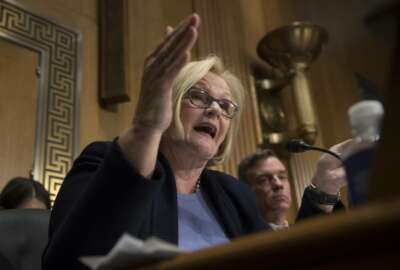It’s practically become an annual tradition. Expecting the worse, several Democratic lawmakers and a few Republicans yet again are attempting to make a statement on a federal pay raise for the next year.
And amid talk of a possible pay freeze in 2019, Rep. Gerry Connolly (D-Va.) and Sen. Brian Schatz (D-Hawaii) are introducing the Federal Adjustment of Incomes Rates (FAIR) Act. This time, the legislation calls for a 3 percent raise for federal employees next year.
There has been no word yet from President Donald Trump about a pay adjustment for civilian or military employees for the next year. Typically, the president indicates his intentions for a pay adjustment, if any, in his annual budget request.
Trump’s 2019 budget proposal is expected sometime next month.
Specifically, the FAIR Act calls for a 2 percent average base pay raise with an additional 1 percent adjusted for locality pay.
The raise could be in line with what the statute-based formula, which typically sets federal pay adjustments for any given year, says that employees should receive in 2019. According to that formula, federal employees should receive a 2 percent average base pay raise next year, and that’s before any additional locality pay adjustments.
House Minority Whip Steny Hoyer (D-Md.), Oversight and Government Reform Committee Ranking Member Elijah Cummings (D-Md.), Reps. Don Beyer (D-Va.), Barbara Comstock (R-Va.), D.C. Del. Eleanor Holmes Norton and 16 other Democrats are sponsors on the FAIR Act.
Both the American Federation of Government Employees and the National Treasury Employees Union also expressed their support in statements on Friday.
“The FAIR Act would help prevent federal employees from falling further behind with a 3 percent pay adjustment in 2019,” AFGE National President J. David Cox said in a statement. “The women and men who guard our borders, serve our veterans, inspect our food and protect our planet are worth this modest investment.”
Connolly, Schatz and the federal employee unions and organizations that offered their support for the FAIR Act said the legislation is an attempt to “restore lost wage increases” for the federal workforce.
“For too long Republicans in Congress have treated the federal workforce like a national piggy bank,” Connolly said in a statement. “They’ve endured three years of pay freezes, a government shutdown, sequestration cuts, furloughs and a mindless, across the board hiring freeze. And to make matters worse, the president has treated federal employees like his own rhetorical punching bag, hurling insults and falsehoods. Yet, despite this increasingly challenging environment, our federal employees continue to serve with dedication and distinction every day. They deserve better.”
This is the fourth year that Connolly has introduced the FAIR Act. He called for a 3.2 percent raise in 2017’s legislation and made the case for a 5.3 percent raise in the 2016 version of the bill.
Congress, however, has never passed any version of the FAIR Act, and actual federal pay raises have fallen short of the legislation’s expectations every year.
“Economic forecasters estimate that wages in the private sector will rise an average of 3 percent in 2018, so it’s perfectly reasonable for federal employees to expect the same modest increase in their paychecks,” NTEU National President Tony Reardon said.
Civilian federal employees on average received a 1.4 percent base pay raise and an additional 0.5 percent for locality pay in 2018. Many of the FAIR Act’s sponsors in late 2017 called on the president to give civilian employees the same raise as members of the military, but those pleas fell on deaf ears.
According to a report from Senate Homeland Security and Governmental Affairs Ranking Member Claire McCaskill (D-Mo.), the Trump administration is considering a pay freeze for civilian employees in 2019. McCaskill’s report cited a preliminary budget “passback” document between the Office of Management and Budget and the Homeland Security Department, which she obtained from a whistleblower.
Copyright
© 2024 Federal News Network. All rights reserved. This website is not intended for users located within the European Economic Area.
